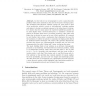24 search results - page 5 / 5 » On No-Regret Learning, Fictitious Play, and Nash Equilibrium |
ICML
2005
IEEE
14 years 5 months ago
2005
IEEE
Learning algorithms often obtain relatively low average payoffs in repeated general-sum games between other learning agents due to a focus on myopic best-response and one-shot Nas...
GECCO
2006
Springer
13 years 8 months ago
2006
Springer
The impact of learning on evolution in dynamic environments undergoes recognized stages of the Baldwin Effect although its cause is not clear. To identify it experimentally, we de...
CRYPTO
2000
Springer
13 years 9 months ago
2000
Springer
In this work we use cryptography to solve a game-theoretic problem which arises naturally in the area of two party strategic games. The standard game-theoretic solution concept for...
JSAC
2007
13 years 4 months ago
2007
— One of the distinctive features in a wireless ad hoc network is lack of any central controller or single point of authority, in which each node/link then makes its own decision...

